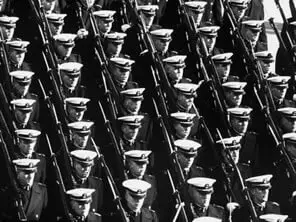The ordinary members of a group; as opposed to the group leadership.
Rank and file
What's the meaning of the phrase 'Rank and file'?
What's the origin of the phrase 'Rank and file'?
file’ is the lining up of soldiers into
ranks (that is, lines).
Rank and file now refers to the ordinary members of any group but it originated as a military term. The rows and columns of soldiers, drawn up for drill and not including officers, were called ‘ranks’ and ‘files’.
This usage dates back to the 16th century and an early example of it in print is found in Robert Barret’s The theorike [sic] and practike of moderne warres, 1598:
To learne to keepe his ranke and file orderly.
The expression is now often shortened just to ‘the ranks’.
It wasn’t until the 19th century that ‘rank and file’ began being used to refer to any other groups. The first of these were political groupings, especially members of trades unions. An example of this was given is in an address from a representative of the American Federation of Labor, reported in The International Steam Engineer magazine, 1818:
“If we could only get the great rank and file of the members to recognise their personal obligation.”
Chess is often described as analogous to warfare and has inherited military parlance in that the rows and columns of pieces are called ranks and files.
The history of “Rank and file” in printed materials
Trend of rank and file in printed material over time
Browse more Phrases
About the Author

Phrases & Meanings
A-Z
A B C D E F G H I J K L M N O P Q R S T UV W XYZ
Categories
American Animals Australian Bible Body Colour Conflict Death Devil Dogs Emotions Euphemism Family Fashion Food French Horses ‘Jack’ Luck Money Military Music Names Nature Nautical Numbers Politics Religion Shakespeare Stupidity Entertainment Weather Women Work
How did we do?
Have you spotted something that needs updated on this page? We review all feedback we receive to ensure that we provide the most accurate and up to date information on phrases.
